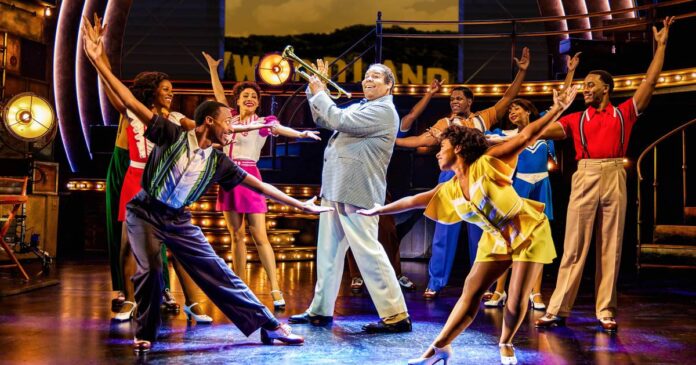The actor James Monroe Iglehart is diving deep into the role of Louis Daniel Armstrong, an American musician as famous for his seemingly ebullient personality as for his horn-blowing skills and unique baritone voice, partly from a combination of botched surgeries and a prolonged cold on a New Orleans steamboat.
Iglehart is just fabulous in “A Wonderful World,” a new musical directed by Christopher Renshaw that opened Friday night at Chicago’s Cadillac Palace Theatre with Broadway aspirations and Vanessa Williams among its producers. The Tony Award under his belt for “Aladdin” is testament to Iglehart’s improvisational skills and on-stage charisma, but that’s far from all he’s is doing here. He clearly has intuited that Armstrong, who navigated American show business throughout the 20th century, had to play multiple characters, and that his chaotic personal life (four wives, hundreds of affairs) suggested an undercurrent of profound pain. Iglehart’s talents could be compared to those of Nathan Lane, if you’ll forgive the over-simplification.
I hope Broadway gets to see Iglehart do Satchmo, as well as see the rest of this massively talented company. But right now, his offerings are choked by an overly long, clunky and simplistic book that (to be frank) squanders the potential musical riches of the show, which are what the audience has come to hear.
Among its problems are great chunks of needless narrative (”And then the stock-market crashed …”), which don’t allow the actors to sit with the dramatic emotions of their characters. Valuable time is wasted telling us stuff like that Los Angeles “was a perfect place for Louis to get into the movies” when the Hollywood sign on the backdrop does that job just fine. There are errors, too — someone talks about Michigan being west of Chicago.
What should happen here is a re-organizing of the show to emphasize the conflicts faced by a Black musician in Armstrong’s era (many of which you can read about in the late Terry Teachout’s “Pops”). They all are right there in the man’s life: the clash of authenticity and commercialization, the outright theft of Black musicians’ rightful income, the progressive exploitation of what once was the music of Black New Orleans, the presence of shady mobsters. And, most apropos here, how Armstrong always had to reconcile his particular “hustle,” that of a professional smiling man, all pearly whites, with what he felt inside and wanted to blow into his horn.
:quality(70)/cloudfront-us-east-1.images.arcpublishing.com/tronc/IHPCZBCRLNDX3JU2HYMQBGHECE.JPG)
The best scene in the show right now is between Armstrong and Lincoln Perry, aka the actor and vaudevillian Stepin Fetchit, where the two men talk about what they do and then tap and play it out, too. DeWitt Fleming Jr. is the killer tapper who plays Perry. He is woefully underused in the show, which is organized around the narration of Armstrong’s four wives: Daisy Parker (Khalifa White), Lil Hardin (Jennie Harney-Fleming), Lucille Wilson (Ta’Rea Campbell) and Alpha Smith (Brennyn Lark). All four of these performers are terrific, but they would be better yet if their characters could lose all the narrative chores and help us explore Armstrong’s struggles with fidelity and love. At times, it’s hard for Armstrong himself to emerge with force in his own show.
The other weird thing here is that we don’t see much of Armstrong with other musicians, which is how many remember him, playing with a great big band like Joe “King” Oliver’s Creole Jazz Band, who whooped it up in Chicago in the 1920s at the famed Lincoln Gardens on E. 31st St. Given who this show has as its lead and the quality of Rickey Tripp’s choreography, I kept waiting for the big scene where Iglehart’s Armstrong would be performing, joshing with the band, singing far more of the hundreds of songs he recorded, mixing it up with the audience. A delight, surely. But it never came, or not at least in a full-blown way. Instead, we got scene after scene involving letters, receipts and domestic altercations. Not what you want in Act 2 of a Louis Armstrong show.
:quality(70)/cloudfront-us-east-1.images.arcpublishing.com/tronc/LTF3GOZK3RCRJHAPDFPSB4JG5E.JPG)
Biographical details that can be found in many jukebox shows about musicians often follow the same narrative lines, given how history teaches us that going out on the road for years takes a toll on a person and anyone who loves them. What this particular show needs is to explore the core of one of the most fascinating and complicated figures in American jazz, a man who touched so much of the complexity of his country and who got trouble with some Black Americans for complicity, and with some whites just for being Black. And yet who played on, smiling all the way.
What a show this could be. Even now, Iglehart is a revelation for Armstrong fans.

Theater Loop
Weekly
Get the latest news and reviews from America’s hottest theater city, delivered to your mailbox weekly.
Chris Jones is a Tribune critic.
Review: “A Wonderful World” (3 stars)
When: Through Oct. 29
Where: Cadillac Palace Theatre, 151 W Randolph St.
Running time: 3 hours
Tickets: $35-$105 at 800-775-2000 and www.broadwayinchicago.com



